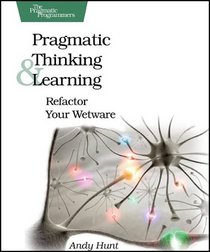The most dangerous thing in the world is a second lieutenant with a map and a compass.
Switch "second lieutenant" with MBA and "compass" with "management book" and you'll have my take on things like this. I say this because I am an MBA.
However, I think I'm going to make an exception for this one. This book is a practical, nay, pragmatic, approach to getting a lot more out of your time. It focuses on the how of the thinking and learning, delving into neurology, cognitive science, learning and behavior theory, plus, a lot of anecdotes.
Anyway, I came to this through my interest in neuroscience and cognitive psychology and the recommendations from Amazon. I love it because it takes many things from books like Kluge, A Mind of Its Own a A User's Guide to the Brain and begins to make them practical and useful, more than just interesting.
What's it about? How to start being aware of some of your own processes of learning, skill acquisition, creativity and problem solving and to get the most out of all of these. Its a bit of a summary - I suspect most of us have seen these tips before, but never in one spot, nor in context of effectiveness.
And while I love it, I'm afraid of confirmation bias with this, but I think I'll learn from it.
Anyway, I'm going to re-read this and do the exercises along the way and see what happens.
Switch "second lieutenant" with MBA and "compass" with "management book" and you'll have my take on things like this. I say this because I am an MBA.
However, I think I'm going to make an exception for this one. This book is a practical, nay, pragmatic, approach to getting a lot more out of your time. It focuses on the how of the thinking and learning, delving into neurology, cognitive science, learning and behavior theory, plus, a lot of anecdotes.
Anyway, I came to this through my interest in neuroscience and cognitive psychology and the recommendations from Amazon. I love it because it takes many things from books like Kluge, A Mind of Its Own a A User's Guide to the Brain and begins to make them practical and useful, more than just interesting.
What's it about? How to start being aware of some of your own processes of learning, skill acquisition, creativity and problem solving and to get the most out of all of these. Its a bit of a summary - I suspect most of us have seen these tips before, but never in one spot, nor in context of effectiveness.
And while I love it, I'm afraid of confirmation bias with this, but I think I'll learn from it.
Anyway, I'm going to re-read this and do the exercises along the way and see what happens.




